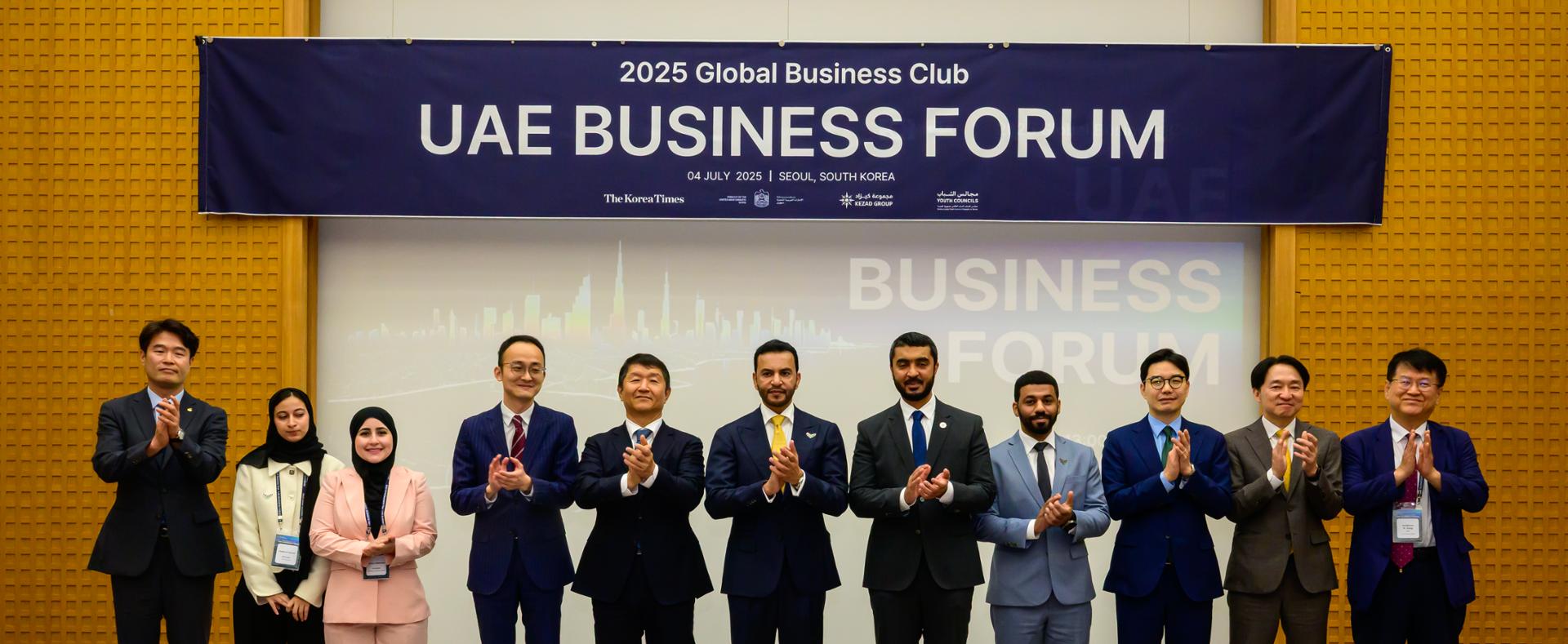Link to the original article :
https://www.koreatimes.co.kr/path/A2025070414080005640
The government of the United Arab Emirates and the country’s largest international trade and economic zone facilitating company urged investments in the Middle Eastern economic powerhouse during a gathering with representatives of Korean businesses in Seoul on Friday.
They introduced the country’s business opportunities at the UAE Business Forum, jointly hosted by the UAE Embassy in Seoul, Khalifa Economic Zones Abu Dhabi (KEZAD) Group, The Korea Times and UAE Youth Councils.
The event was the latest edition of the newspaper’s Global Business Club, a series of investor-oriented networking initiatives.
The UAE government, represented by the country’s Ministry of Foreign Affairs, said investing in the UAE is safeguarded by the country’s investor-friendly legislation and transparent regulatory guidelines. A stable environment and increased diversification of non-oil sectors are other local merits, according to the authority.
Kawthar Al Kharoossi, acting head of the investment promotion and facilitation section under the ministry, said the country’s gross domestic product (GDP) and nominal GDP both increased each year from 2024 and are projected to maintain an uptrend until 2028.
“Moody’s Credit Rating in 2023 rated ‘Aa2’ for our country, the strongest sovereign rating in the Middle East. Our compound annual growth rate of export, import and foreign direct investment (FDI) inflow all jumped by up to 12 percent from 2013 to 2023. Our taxes are low and we have a prime geostrategic location, a strong logistics and maritime network and well-developed infrastructure. We received $31 billion in FDI inflows in 2023,” Al Kharoossi said.
Al Kharoossi said the UAE government has prioritized key sectors to attract investment including human capital development, health and pharmaceutical, advanced tech and artificial intelligence (AI), logistics and warehousing, agricultural and green technology and industrial manufacturing.
The government has set roadmaps and multiple initiatives under each category. To spur the AI and information communication technology (ICT) industry, the country last year invested $23 billion under its National AI Strategy 2031. She also said that under the country’s Fourth Industrial Revolution Strategy, by 2030, AI will contribute 14 percent of national GDP, or $96 billion.
“Investors to the UAE should first decide between onshore and offshore, each requiring a different procedure to their licensing and registration. And our incentives include Golden Visa, no income tax, low corporate tax and 100 percent foreign ownership,” Al Kharoossi said.
KEZAD Group
Xiaolei Yu, senior manager for the commercial and business development division under KEZAD Group, said the UAE is one of the world’s most attractive investment hubs. He highlighted that the country drew the most FDI among countries in the Middle East and North Africa (MENA) in 2022, received the world’s fourth-largest number of greenfield projects in 2023 and accounted for 60 percent of total FDI inflows to the Gulf Cooperation Council countries in 2022. Total value of FDI inflows to the UAE in 2022 reached $22.7 billion, he added.
“Abu Dhabi is at the center of trade between Asia, Europe and Africa and a gateway to the world’s fastest growing economies. The country has a strong and growing economy, was among the world’s 30 largest economies in 2022, posting $310 billion GDP in the same year. Our infrastructure is excellent, with Abu Dhabi in 2022 achieving the highest smart city development among countries in MENA,” Yu said.
KEZAD Group, according to Yu, actively works with the UAE government to achieve common economic goals. Doubling the size of the country’s manufacturing sector by 2031 is one of them, along with advancing the transition to a circular economy, creating 13,600 skilled jobs and increasing non-oil exports by 143 percent. Under the Abu Dhabi Falcon Strategy, the country aims to see non-oil GDP grow by up to 12 percent and non-oil productivity grow by 59 percent by 2040, he added.
KEZAD Group is a subsidiary of AD Ports Group, which operates across the fields of digital, economic cities and free zones, logistics, maritime and ports ? key sectors of Abu Dhabi’s diversified economy. Abu Dhabi’s Khalifa Port, located in proximity to KEZAD and with its advantageous location and extensive international network, serves as perfect crossroads, connecting Europe and the West with the Middle East, Asia and Africa, facilitating global trade. Along with the country’s key freight and long-distance travel infrastructures including Etihad Rail and air transport, the port also provides fast access to over 4.5 billion people in over 90 countries across Middle East, Africa and South Asia.
“We have many mega-projects under construction in Abu Dhabi, creating a vibrant ecosystem with robust industrial infrastructure and enabling leisure, social and commercial facilities,” Yu said. Strategic clients such as Metal Park, Emtelle BTS Fibre Factory, and KEZAD Group’s own projects such as Abu Dhabi Food Hub and KEZAD Logistics Parks expansions are among the large-scale projects that have all passed their first phase of construction. He added the company offers full value-chain across more than 10 key industries including automotive, metals, plastics and polymers, food and agricultural tech.
Lee Yoon-suk, a KEZAD representative in Korea, raised awareness on the need to understand the country in terms of tradition and fundamental culture when doing business there. In his presentation, “Business Guidelines to the UAE Market and KEZAD Group,” he said Korean companies investing in the UAE must understand and respect diverse ethnicities and traditional beliefs among the local people. Lee, who has been working with Middle East countries for the past 14 years, said that without such efforts, invested businesses there will hit a wall.
“Not just ethnic aspects ? Korean companies must understand how people in the UAE do business there, how the government oversees business there and what influences the economy there,” Lee said. “They shouldn’t just bring their own products and try to sell them to local consumers there by partnering with local firms. They must first localize their products in favor of their target consumers. Localization is key for not just products but also a company’s image.”
